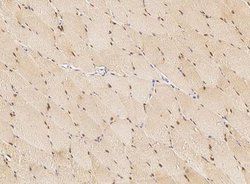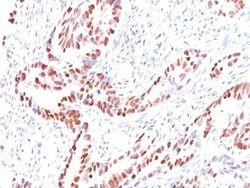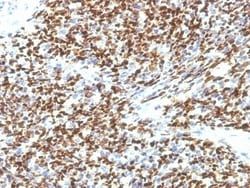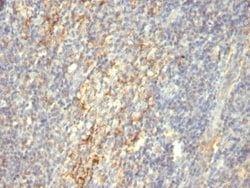Pax7 Antibody (SPM613), Novus Biologicals™
Manufacturer: Fischer Scientific
The price for this product is unavailable. Please request a quote
Antigen
Pax7
Classification
Monoclonal
Concentration
0.2mg/mL
Dilution
Immunohistochemistry-Paraffin 0.5 - 1.0 ug/ml
Gene Accession No.
P23759
Gene Symbols
PAX7
Immunogen
Recombinant fragment (aa300-600) of human PAX7 protein
Purification Method
Protein A or G purified
Regulatory Status
RUO
Primary or Secondary
Primary
Test Specificity
The Pax gene family of nuclear transcription factors is comprised of nine members that function during embryogenesis to regulate the temporal and position-dependent differentiation of cells. In addition, the family is involved in a variety of signal transduction pathways in the adult organism. Mutations in the Pax family of proteins have been linked to disease and cancer in humans. Pax-7 is a protein specifically expressed in cultured satellite cell-derived myoblasts. In situ hybridization reveals that Pax-7 is also expressed in satellite cells residing in adult muscle. A chromosomal aberration in the gene encoding Pax-7 causes rhabdomyosarcoma 2 (RMS2) (also called alveolar rhabdomyosarcoma).
Content And Storage
Store at 4C.
Isotype
IgG1 κ
Applications
Immunohistochemistry (Paraffin)
Clone
SPM613
Conjugate
Unconjugated
Formulation
10mM PBS and 0.05% BSA with 0.05% Sodium Azide
Gene Alias
FLJ37460, HuP1, paired box 7, paired box gene 7, paired box homeotic gene 7, paired box protein Pax-7, paired domain gene 7, PAX7 transcriptional factor, PAX7B, RMS2
Host Species
Mouse
Molecular Weight of Antigen
57 kDa
Quantity
0.2 mg
Research Discipline
Apoptosis, Mesenchymal Stem Cell Markers, Stem Cell Markers
Gene ID (Entrez)
5081
Target Species
Human
Form
Purified
Description
- Ensure accurate, reproducible results in Immunohistochemistry (Paraffin) Pax7 Monoclonal specifically detects Pax7 in Human, Mouse samples
- It is validated for Flow Cytometry, Immunohistochemistry, Immunohistochemistry-Paraffin.






